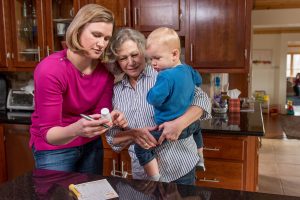Top Tips to Protect Kids from Poisoning
Sharing is caring!

Medications are the leading cause of child poisoning, and it almost always happens when a child gets into medicine during a moment alone. Babies and toddlers move through the world touching and tasting everything in reach, constantly testing their new motor skills. Many prescription and over-the-counter medicines, vitamins and supplements look and taste like candy. Putting it in their mouths can be a real – and really dangerous – temptation for little kids. While it’s important to encourage our kids to explore and discover new things, when it comes to medication, we also want to be careful to keep them safe. Here are a few tips to show you how.
- Store all medicine up and away and out of sight and reach every time. Safe medicine storage means out of sight and out of reach, not one or the other. To be safe, medicine should be stored out of sight in a cabinet or drawer where children can’t see it and out of reach. Do it every time and you’ll form a safe habit. That little bit of time is worth the investment in your child’s safety.
- Only use the dosing device that comes with the medicine. Kitchen spoons aren’t all the same, and a teaspoon or tablespoon used for cooking won’t measure the same amount of medicine as a dosing device.
- Keep medicine in its original child-resistant packaging. If you or another family member do choose to use a pill organizer or baggie to help manage taking medicine, make sure you always store it up and away and out of sight and reach.
- Practice safe storage of medicine as soon as your first child is born. Babies as young as 3 weeks of age have ended up in the emergency department after getting into medicine left within reach.
- Put the Poison Help number – 1-800-222-1222 – into your phone and post it visibly at home. Having the number handy – even if you think it’s easy to look up – is an easy way to protect kids and be ready for an emergency.
- Instead of keeping medicine handy, use safe reminder tools to help you remember when to take and give doses. Here are some easy ideas you can use at home:
- Set an alarm on your watch or cell phone.
- Write a note to yourself and leave it somewhere you look often, like on the refrigerator door.
- Combine taking daily medicines with a daily task like brushing your teeth.
- Use a medication schedule card.
For more information about keeping kids safe from poisons visit the Georgia Poison Center’s website or follow them on Facebook!
For more information and resources about protecting kids on the road, at home and at play, visit SafeKids.org
Join us on Facebook


